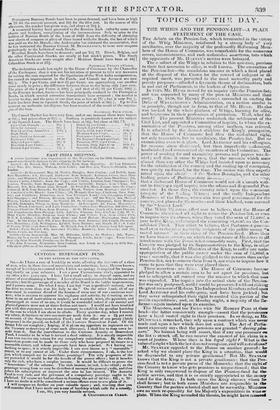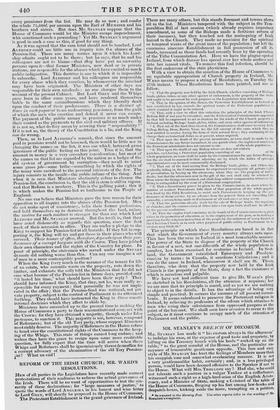TOPICS OF THE DAY.
THE WHIGS AND THE PENSION-LIST—A PLAIN STATEMENT OF THE CASE.
THE debate on the Pension-list, which terminated in the victory of the Whig Ministers, reinforced by a strong body of' ferry auxiliaries, over the majority of the professedly Refertuing Mem- bers of' the house of Commons, was remarkable for the numerous errors, inconsistencies, and rash unfounded assertions, into which the opponents of Mr. HARVEY'S motion were betrayed.
The ednduct of the Whigs in relation to this question, previous to their last accession to office, is well known. The enormities of the Pension-list—the scandalous manner in which a fund placed at the disposal of the Crown for the reward of indigent or ill- requited merit, was perverted to the most unworthy party anti private purposes—affotded a favourite thetne of declamation, both in and out of Parliament, to the leaders of Opposition.
In 1828,11r. limn?. moved for an inquiry into the Pension-list; and was supported by many of the prescnt Ministers and their party. In 1830, Sir HENRY PARNELL succeeded in ousting the Duke of' WELLINGTON'S Administration, on a motion similar in ill principle, though not ill form, to that of Mr. Hums:. He also was barked by the whole phalanx of Whigs, burning for office, and boisterous in their professions of patriotism. Well, what fol- lowed? The present Ministers undertook the settlement of the Civil List, and appointed a Committee of inquiry, to whom the ex- amination of the Peusions, among other matters, was refened. It is admitted by the fiercest sticklers for Kingly prerogative, that the House of Commons had then the undoubted rigbt. not only to examilie, but to annihilate, the Pension-list. But no examination even to:Ai place. -Lord ALTHORP and his colleagueR, fur reasons since discovered, but then imperfectly understood, hoodwinked and overreaelled the members of the Committee. The power of sending for and examining persons and papers was de- nied; aid thus it came to pvs, that the measure which mere almost than any other the Whigs had insisted upon as necessary tbr the satisfaction of the country and the rooting up of corruptioa, was quietly cushioned, for the time. The nation was theu eagerly
intent upon the aboliC t11- Rotten Boroughs, and the othlt leading points of Parliamentary ". • that a RefOrtned House of Commons would not sit a month with- out in,tituting a rigid inquiry into the odious and disgraceful Pen- sion-list. In those days, the country relied upon the c•ansistent
intega it of' the !. W big ; and the really Indepeutlext Members of the 'louse, who,e aim was good govermwot for the country, not places for tht2ntielve.; and their kindred, were cozen41 by the " honest Lord.- The Whig Mi.iistcrs affect now to believe, that the House of Commons aim nlonel all right to rovise the Pension-list, or evun. to inquire into its abuses, wheu they voted the sum of 75,00tt;'. a year tothe Kioti, ited charged the remaining :45,000/. on the Csa- soliilated Fund. l'Iwy affect to believe, that Parliatneat guacau-
teed ev2n to the tof,;t tecipients of the public money "a
vesttil interest siiax of the Peusion.fund. Here thia we have two as, cri ions, on which the resistance of .Miaisters to all interference with the Fensit,n-liNt ostensibly rests. First, that dte Country was pledged by its Representatives to the King, in akar words to the responsible Ministers of the King., to suffer any males. appropriation of the public. money under the sum of 75,000.1.i. year : secondly, that it was also plede,ed to the persons then on the Pension-list, not to remove them from it, nor even to inquire how it came to pass that. they were ever placed there.
These assertions are hills. The House of Commons bee pledged to allow a certain stun to be set apart l'or peusions, but not to relinquish all eontrol over the manner in which that sroun was expended. The inquiiy info the actual state of the Pension- list was only postponed, until ir could he prosecuted without risking the great measure of Reform. The Independent Members relied upon Lend ALTHORP and his colleagues, and have been jockied; but they never relinquished their right to control this portion of the public expenditure; and, on Monday night, a majority of the Re- formers again insisted upon its exercise.
The Ministers, and the Tories with Sir ROBERT PRRE at their head—the latter consistently enough—assert that the pensioners have a legal vested right to their pensions. In so doing, as Ifir. O'CONNELL remarked, they rely upon a contract which was never made and upon a law which does not exist. The Act of Parlia- ment expressly says that the pensions are granted" during plea- sure: No human being will assert, that if any one pensioner as the list is struck off, he can recover the amount of his claim ma court of justice. Where then is his legal right? What is the valueof a right which the law dues not recogeize,and will not enforce? Mr. STANLEY appealed to the House on another ground: ke asked why we should place the King in a situation, that would be disgraceful to any private gentleman? But Mr. STANLear knows that the King is not a private gentleman; that the Pen- sion-fund is not a private purse of the Monarch; that the righter the Country to know who gets pensions is unquestioned; that the King is only empowered to dispose of the Pension-fund for the public service, and that it is as strictly appropriated as the mcney voted for the Army. In both cases the King chooses wham he shall favour; but in both cases Ministers are responsible to the Country that. the parties selected shall not be uuworthy. Ministeni owe no such responsility for his Majesty's expenditure in wise or plate. When the King ascended the throne, he might have mama every pensioner from the list. He may do so now ; and confer the whole 75,0001. per annum upon the Earl of MUNSTER and his
brothers and sisters. But does Mr. STANLEY suppose that the House of Commons would let the Minister escape impeachment, whb sanctioned such a proceeding? Yet Mr. STANLEY'S argument is good in such a case as this, if good for any thing. As it was agreed that the sum total should not be touched. Lord ALTHORP could see little use in inquiry into tie abuses of the Pension-list. There are many names upon it which his Lord-
ship admits ought not to be there; but he says, that he and his eolleagues are not to blame—that they have put no unworthy
persons upon it—that former Ministers, now dead or in private stations, are responsible for the abuses which have excited so much public indignation. This doctrine is one to which it is impossible to subscribe. Lord ALTHORP and his colleagues are responsible - for every abuse which they sanction, by whomsoever the mischief may have been originated. The Ministers of other days are responsible for their own misdeeds : no one charges them to the
-.account of the present Cabinet. But Lord GREY and the Whigs nave been in office some years, and have rendered themselves - liable to the same animadversions which they liberally dealt • upon the conduct of their predecessors. There is a distinct of- fence in each payment to an undeserving pensioner, from the guilt of which the men who sanction and defend it never can escape.
• The payment of the public money in pensions is as much under their control as the payments to the civil and military officers. If
it is not so, what do they mean by avowing their " responsibility ?" If it is not so, the theory of the Constitution is a lie, and the King can do wrong. Then, as to Lord ALTHORP'S remark, that since the amount paid in pensions would not be lessened, there would be little use in changing the names on the list, it was one wind-7 betrayed gross ignorance of the public feeling on this point. Tri,e it is, that the amount in money is a very secondary consideration ; but most of the names on that list are regarded by the nation as a badge of the old system of government by corruption—they recall to mind some gross job—some bribe—something by which the rights of the many were sacrificed to the personal interests of the few. The injury consists in the insult—the public infamy of the thing. And when it is seen that Ministers obstinately refuse to cleanse the Pension-list, the conclusion is, that the old system is still in vigour,
• and that Reform is a mockery. This is the galling point; this it is which makes the Pension-list so loathsome to the People of England. No one can believe that Ministers gave the true reason for their opposition to all inquiry into the abuses of the Pension-list. Men do not make sport of consistency, belie their former professions, and hold themselves up to derision throughout the land, unless the motive for such conduct is stronger far than any which Lord ALTHORP and Mr. STANLEY avowed. But the truth is, that they have acted dishonestly as regards this question, since the first
• week of their accession to office. They are under a pledge to the King to support his Pension-list at all hazards. If they fail in sup- porting it, the King will try and get those in their places who will succeed. Their tenure qf office, therefore, depends upon their per- . formance of a corrupt bargain with the Crown. They have jobbed their own characters and the rights of the Country for place. In
• point of principle, the statesmen who served under the STUART dynasty did nothing worse than this. Can any one imagine a set of men in a more contemptible position? 'When the King (very much in the manner of the tenant for life of an estate, who commits waste on the property, cuts down the timber, and exhausts the soil) told the Ministers that he did not care what became of the Pension-list in future days, provided only "it lasted his time," what should have been their reply ? They
• should have informed the King, that they, not he, were really re- sponsible for every payment ; that personally he was not impli- cated in the affair; that the Pension-fund was national, not pri- vate property, subject to the control of Parliament to its uttermost farthing. They should have instructed the King in those consti- tutional doctrines which they affect to abide by.
Ministers have succeeded up to the present time in making the • House of Commons a party to their unconstitutional comustet with the Crown; for they have obtained a majority, though under false pretences, to sanction it. This majority is not, however, composed of Reformers; but of the old Tory party, whose support Ministers most richly deserve. The majority of Reformers in the House refuse to hand over the constitutional rights of the Commons to the keep- ing of the Whigs. This state of things cannot long endure; and unless they have the grace to resign upon some more creditable question, we fully expect that the time will arrive when these Whigs and Reformers shall be ignominiously thrust fromoflice for
• a corrupt advocacy of the abomination of the old Tory Pension- list What an end!



















 Previous page
Previous page